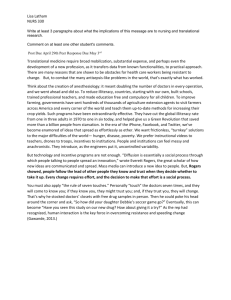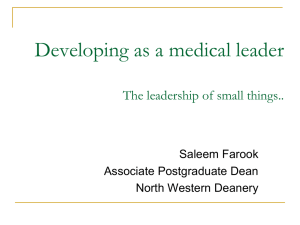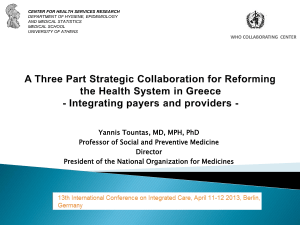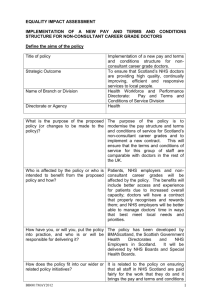Leadership in (GP) Appraisal | File Size: 541.5 KB
advertisement
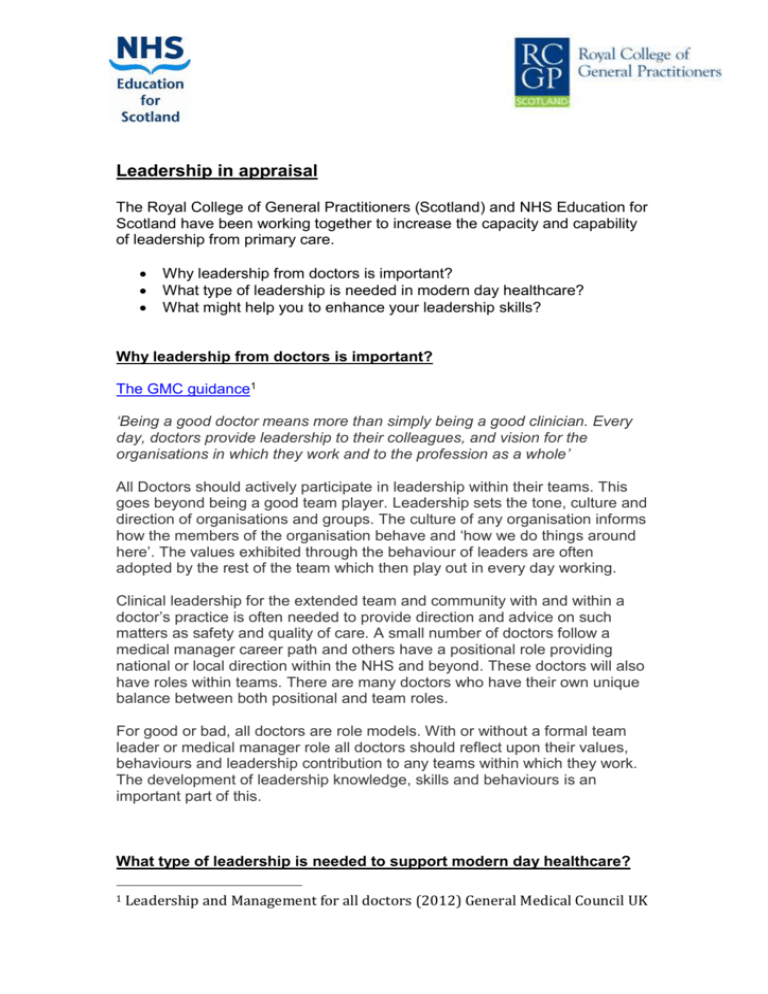
Leadership in appraisal The Royal College of General Practitioners (Scotland) and NHS Education for Scotland have been working together to increase the capacity and capability of leadership from primary care. Why leadership from doctors is important? What type of leadership is needed in modern day healthcare? What might help you to enhance your leadership skills? Why leadership from doctors is important? The GMC guidance1 ‘Being a good doctor means more than simply being a good clinician. Every day, doctors provide leadership to their colleagues, and vision for the organisations in which they work and to the profession as a whole’ All Doctors should actively participate in leadership within their teams. This goes beyond being a good team player. Leadership sets the tone, culture and direction of organisations and groups. The culture of any organisation informs how the members of the organisation behave and ‘how we do things around here’. The values exhibited through the behaviour of leaders are often adopted by the rest of the team which then play out in every day working. Clinical leadership for the extended team and community with and within a doctor’s practice is often needed to provide direction and advice on such matters as safety and quality of care. A small number of doctors follow a medical manager career path and others have a positional role providing national or local direction within the NHS and beyond. These doctors will also have roles within teams. There are many doctors who have their own unique balance between both positional and team roles. For good or bad, all doctors are role models. With or without a formal team leader or medical manager role all doctors should reflect upon their values, behaviours and leadership contribution to any teams within which they work. The development of leadership knowledge, skills and behaviours is an important part of this. What type of leadership is needed to support modern day healthcare? 1 Leadership and Management for all doctors (2012) General Medical Council UK Collaboration versus Command and Control The Academy of Medical Royal Colleges and the Institute of Institute of Innovation and improvement describes a Medical Leadership Competency Framework (MCLF)2.The MCLF is underpinned by the concept of Shared Leadership3 This states ‘No individual clinician is an expert in all aspects of the care needed for the patient and therefore cannot lead the others in the team through a command and control model.’ and advocates that ‘Whilst there is a formal leader of the team who is accountable for the performance of the team, the responsibility for identifying problems, solving them and implementing the appropriate action is shared by the team. The formal leader’s role is to create the climate in which the team can flourish through team building, resolving conflicts and being clear about the vision.‘ The concept fits well with the growing need for healthcare to be provided by highly independent knowledgeable individuals working as part of a multi disciplinary team. There is also the need to allow teams to take ownership and set direction of services based upon the needs of patients. What might help you to enhance your leadership skills? Developing leadership is firmly rooted in understanding oneself and one’s values and how to interact with and influence others. Leadership is a social process by which we effect change. Learning and honing leadership skills is a developmental process often likened to a journey. Leadership development is also often experiential, i.e. learned from being involved in experiences and interactions. There are formal routes to leadership development, e.g. courses and programmes, and informal routes, like mentoring and role modelling. Leadership development activities may include; Reflection All doctors are required to undertake multi-source feedback from colleagues and patients; doctors can consider specific areas within these pertaining to leadership and discuss them with their appraiser. The NHS Leadership Academy provides a self assessment tool which can also be used to aid reflection on leadership competencies. Some doctors will undertake a ‘leadership 360’ (multi-source feedback specifically related to leadership competencies). This is usually done as part of a more formal leadership programme Medical Leadership Competency Framework Enhancing Engagement in Medical Leadership Third Edition, July 2010, Academy of Medical Royal Colleges NHS Institute of Innovation and Improvement 3 Shared Leadership Underpinning of the MCLF Academy of Medical Royal Colleges NHS Institute of Innovation and Improvement 2 NHS Education for Scotland (NES) NES offer a range of options which include the following: Practice Based Small Group Learning Module (PBSGL) commissioned by RCGP Scotland for use by teams and individuals within groups. This module can be studied by anyone, whether or not they are a PBSGL member so long as the PBSGL methodology is adhered to. Leadership Programmes; The Leadership and Management Programme (LaMP), Leading for the future and Delivering the future. Mentoring Mentorship can be formal or informal. In a formal sense and pertaining specifically to leadership; mentoring is defined as a means of supporting individual learning and development to lead improvement of quality in the workplace. It is about increasing an individual’s competence and confidence with one person helping another to make significant transitions in knowledge, work or thinking. A clearly structured, time-bound and self-managed process with clear, mutually agreed roles and goals. Many local lead appraisers and RCGP faculties can match mentoring partnerships for mentors and mentees, you may consider contacting them. Mentoring for Leading Quality is for all NHS Scotland and partner organisations. The online mentoring matching application is accessible via the QI Hub website Networks & Communities section www.peopleconnect.scot.nhs.uk/Mentoring Mentor training may be available from RCGP Scotland South East Faculty Tools There are a number of toolkits which can be used to support people to lead change in teams: Productive General Practice. The Good Practice Leadership Toolkit. www.qihub.scot.nhs.uk eLearning eLearning for Healthcare provides an elearning resource to support clinicians to develop leadership. Faculty of Medical Leadership and Management (FMLM) Endorsed and led by the Academy of Medical Royal Colleges, FMLM is a membership organisation which any registered doctor or dentist can join. FMLM provides regular webinars, access to leadership literature and the opportunity to network with other leaders in the medical and dental professions. Local Courses and programmes All Health Boards in Scotland have Organisation Development Departments who provide Leadership and Management courses and programmes. These may be accessed by contacting those departments directly.

